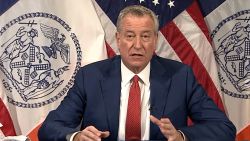The governors of Maine and New York deployed the National Guard in response to dangerously low capacity at statewide medical facilities due to the pandemic.
The New York National Guard announced Wednesday that it had deployed 120 medics and medical technicians to a dozen long-term care facilities statewide. The deployment came at the behest of Gov. Kathy Hochul, who issued the order last week in response to staffing shortages.
Service members deployed to facilities in Syracuse, Rochester, Albany, Buffalo, Utica, Plattsburgh, Uniondale, Liberty, Vestal, Olean, Lyons and Goshen, the Guard said in a statement.
Hochul has indicated that she may deploy the Guard to hospitals as well – as of last week, some 50 hospitals in northern New York had less than 10% bed capacity in large part due to lack of staff.
In Maine, Gov. Janet Mills activated the National Guard following a spike in Covid-19 cases.
“I do not take this action lightly, but we must take steps to alleviate the strain on our health care system and ensure care for all those who need it,” Mills said in a statement.
The state reported a record-high of 379 people hospitalized with Covid-19 as of Wednesday, 60 of whom were on ventilators.
Mills’ office said in a statement Wednesday that Maine had only 42 ICU beds available statewide.
Some 73% of Maine residents have received a full initial dose of Covid-19 vaccine, according to state data, with 16% of the population receiving a booster shot.
New Hampshire governor calls on FEMA and National Guard to prepare for winter Covid-19 surge
Epidemiologist Michael Osterholm said Wednesday he thinks the whole country will see Covid-19 case numbers go up in coming weeks. Already 23 states have had more than a 20% increase in case numbers in just the last two weeks.
There have been surges in the Northeast and the surges in the upper Midwest have been “dire,” said Osterholm.
“But we expect to see other areas of the country also light up in the next several weeks,” Osterholm, the director of the Center for Infectious Disease Research and Policy at the University of Minnesota, told CNN’s Erin Burnett.
The biggest problem are the unvaccinated. “We have tried everything from public relations to incentive offers, to just having people see what’s happening in our intensive care units and we still have that reluctant group of individuals that just won’t get vaccinated,” said Osterholm.
The country also has work to do to convince more people to get a booster. Only about 26% of adults have gotten booster shots and that’s a problem, he said.
Meanwhile, New Hampshire Gov. Christopher Sununu is calling on the Federal Emergency Management Agency and the National Guard to help the state prepare for the Covid-19 winter surge.
“We reached out to FEMA to request some staffing assistance in our health care facilities, preparing for the winter surge,” Sununu said in his Covid-19 news conference Wednesday.
“They did indicate to us that they’d be sending a few dozen individuals to New Hampshire to help out, with the first 24-person team arriving as early as this weekend.”
Sununu said that the extra staffing will allow hospitals to open entire wings so that they can better serve their community.
FEMA will also be assisting by providing 30 paramedics who will be arriving in New Hampshire by the end of next week. “We are assigning those 30 paramedics to hospitals with the highest Covid burden,” Sununu said.
Sununu also announced that in coming weeks, the state will be deploying an initial group of 70 men and women from the National Guard to help hospitals where the need is most severe, assisting with tasks that will allow for a smoother operation.
The National Guard will assist with “everything from soup, food service or clerical tasks – things that can just flex, allow a hospital or health care facility to flex their own internal staff for better coordination of effort and ultimately better health care services,” he said.
Dr. Benjamin Chan, state epidemiologist for the New Hampshire Department of Health and Human Services, who also attended the news conference, reported that 1,184 people were diagnosed with Covid-19 Wednesday.
“Over the last week we have averaged between 1200 to 1300 new infections each day, and there are currently 9,868 people with active infection,” he said. “Our test positivity rate continues to be high.”
Chan said that hospitalizations and deaths have continued to increase.
“Currently there are 462 people hospitalized statewide with COVID-19, and unfortunately, we have 11 new deaths from COVID-19 to report today, bringing the total number of people that have died from COVID-19 to 1,768.”






















